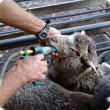Sheep
The key products of the Western Australian sheep industry are wool, sheepmeat (lamb and mutton) and live sheep. At around 12.4 million sheep, the WA flock turns off between 4.5 and 6 million sheep and lambs for meat and live export as well as 65 million kilograms of greasy wool (primarily for export markets) annually.
The Merino is the most common breed of sheep in WA, making up 80% of the state's flock. The remainder are ‘British breeds’ or so-called maternal breeds, meat specific breeds such as Dorpers and some breeds for specialty meat and fibre markets.
The Department of Primary Industries and Regional Development's current focus is on increasing lamb supply, improving the productivity, welfare and sustainability of sheep production and developing and extending targeted information products and services to generate practice change. In an effort to increase the marking rate of lambs, the department, in collaboration with industry, has developed the More Sheep initiative.
Articles
Pages
Filter by search
Filter by topic
- Livestock management (13) Apply Livestock management filter
- (-) Remove Management & reproduction filter Management & reproduction
- (-) Remove Pests, weeds & diseases filter Pests, weeds & diseases
- Livestock health & diseases (12) Apply Livestock health & diseases filter
- Diseases (12) Apply Diseases filter
- Biosecurity & quarantine (8) Apply Biosecurity & quarantine filter
- Biosecurity (8) Apply Biosecurity filter
- Livestock disease surveillance (7) Apply Livestock disease surveillance filter
- Livestock biosecurity (7) Apply Livestock biosecurity filter
- Livestock parasites (4) Apply Livestock parasites filter
- Beef cattle (2) Apply Beef cattle filter
- Invasive species (1) Apply Invasive species filter
- Mechanical, physical and cultural (1) Apply Mechanical, physical and cultural filter
- State Barrier Fence (1) Apply State Barrier Fence filter
- Goats (1) Apply Goats filter
- Food, export & investment (1) Apply Food, export & investment filter
- Control methods (1) Apply Control methods filter
- Dairy cattle (1) Apply Dairy cattle filter
- Feeding & nutrition (1) Apply Feeding & nutrition filter


